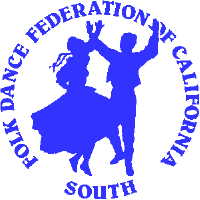
|
Folk Dance Federation of California, South, Inc.
|

|
CLICK AN IMAGE TO ENLARGE
For many folk dancers, the Balkans are "Mecca," the land from which came the folk dances that are our passion. Travel there is a dream realized by few; living there by even fewer. Recent posts on the East European Folklife Center (EEFC) newsgroup have contributed invaluable information about traveling there, what to find and where even simple things, such as: "How do I indicate 'yes' or 'no' in Bulgaria< / Greece / Macedonia?" Or "Where can I find musical instruments / carpets / costumes / whatever?" and "What is the best way to travel?"
First of all, the traveler must realize that the Balkans comprise a widely diverse collection of ethnic cultures with widely differing customs, attitudes, beliefs, and practices. What is normal in one region will be unthinkable in another and uninformed travelers have experienced unnecessary problems and hardships because they failed to do their homework and prepare before going there.
It's wise to make your first trip there with an organized tour group. Folk dancers are very fortunate to have a number of "native" tour guides living here, folk dance teachers who organize and lead tours to their native countries and give us far more interesting tours than most people get from cathedral-hopping tour companies.
The tour leader should give you some guidelines about how to behave, how to count, how to order food, how to do any of the countless things we do here without thinking about it because they are necessary and common behaviors. But thay can't cover all the possibilities, so here are a few items to add to your list.
Travel
Public transportation by train or bus is cheap and usually convenient. You can obtain an unlimited first-class rail pass for most of the Balkan countries in 5-, 10-, or 15-day increments. Contact Rail Europe for information.
Many recommend bus transportation over rail because of more frequent departures, more frequent stops, more convenient routes, and less expensive fares.
Be aware that Europeans have a deathly fear of "drafts." They fear that a draft of fresh air is certain illness and probable death. As a result, all windows are kept closed at all times, including those in homes, public buildings, trains, and buses.
That means that your convenient and cheap public transportation will probably be hot, odorous, airless, smoke-filled, crowded, and closed. Opening a window is a sure way to raise the ire of everyone around you who fear the deadly draft but are unconcerned about the effects of ever-present tobacco.
You can choose a rental car, however, the driving habits of the natives in many countries are frightening at best. Though the most expensive form of travel, it is the most convenient and you can open the windows if you care to.
"Yes" or "No"
Even something as simple as nodding your head can get you in trouble. Each country, even various regions within a country, will often have different ways of expressing this. The Bulgarians' way is exactly opposite from ours: "yes" is a sideways shake of the head, while "no" is an up and down nod. In Greece and parts of Macedonia, "no" is indicated with a sharp lifting of the head, often accompanied by a "tsk" sound. There are others. It is wise to determine the local mannerisms and words for "yes" and "no" where ever you are. "Yes" instead of "no" can get you into all kinds of uncomfortable situations, sort of like accidentally bidding at an auction.
The "Evil Eye"
in Greece, and in most other areas, superstitions die hard. The palm of the hand, when directed toward someone – as when waving – is the equivalent of putting a hex on that person. It makes them uncomfortable. In Greece, watch how the locals greet each other and don't be the effusive American tourist, waving to friends, hosts, or anyone.
Dancing with the "Natives"
Greece, again, seems to be where American folk dancers make the most serious blunders in dance etiquette. The taverna or some village celebration is not like your local folk dance club. Many dancers are to be led by the person who pays the band and that person decides who should dance the dance. Often, dances are performed only by certain people (men, women, unmarried women, etc.). Imagine the consternation of perceptions of a small group of men or a woman joining their private dance.
Learn to observe carefully before acting. Get some advice from your guide. But don't just jump up and join any dance, or worse – lead one!
Shopping
That's what many of us go there for. Try to learn the difference in quality in the items you seek. There are a lot of cheap imitations of everything. Even in Budapest, Hungary, as soon as the local merchants discovered the popularity of the women's dress from Kálotaszeg, hundreds of cheap imitations, hastily constructed of cheap fabrics and trims, appeared in the folk art shops all over the city at ridiculous prices.
In Skopje, Macedonia, begin at the costume/carpet/textile shop of the Djakova family that faces onto the Bit-Pazar, the open-air vegetable-and-small-stuff market at the northeast corner of the Stara Čaršija (Old Bazar) district, bounded on the east by the Boulevard Krste Misirkov. There us usually a fairly conspicuous display of carpets, cushion-covers, saddlebags, and such out in front. There is an unassuming door (at which you should knock) leading into their pleasant little courtyard. The house stretches around this space, on one side of which is storeroom and display space for the merchandise. They deal in costumes, carpets, and rugs and are well-educated and cosmopolitan people in the Islamic style who speak a number of languages, including English. They have a great appreciation of and technical expertise concerning costumes and textiles of the central Balkans.
Most cities and towns still hold weekly open-air markets. It is possible to find folk costumes, fabrics, and art items there, but much of it has been picked over by traveling folk dancers long ago. Good luck!
Be aware that the history of the Balkans is very unique, the cause of many centuries-old feuds and strongly-held prejudices. They may sound foolish and trite to us, but they are a serious part of life in the Balkans. Be aware of them and try to avoid them. Enjoy the scenery and the music and the festivals and bring home lots of memories.
Used with permission of the author.
Printed in Dance Traditions, February 1998.